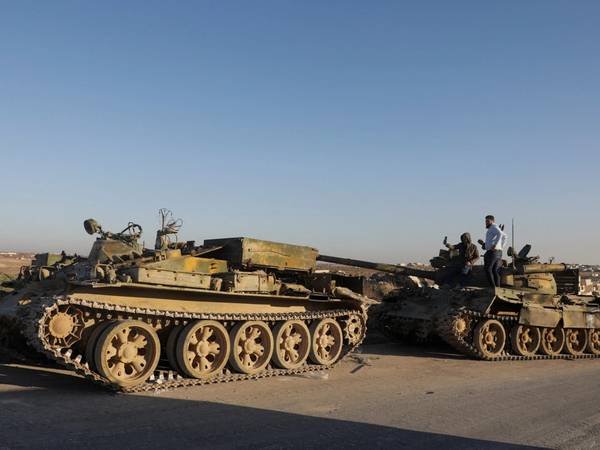As Syria’s political stability crumbles amid civil war in one of the biggest threats to President Bashar al-Assad since he took power in 2000, Iran-backed militias entered Syria overnight from Iraq.
Ready to support Assad's forces battling Islamist insurgents, they were heading to northern Syria according to Reuters, who spoke to two Syrian army sources.
Chris Doyle, director of the Council for Arab British Understanding in London, told Iran International: “The whole situation is extremely fluid but Iran will be sure to shore up its position as it’s very conscious of losing ground across the region after Hezbollah has been politically and military degraded.”
In recent months, Israel has taken out swathes of the group's leadership in targeted strikes as well as at least 1,500 operatives in two days of synchronized explosions of the group's pagers and walkie-talkies.
Reuters reported that dozens of Iran-aligned Iraqi Hashd al Shaabi fighters from Iraq also crossed into Syria through a military route near Al Bukamal crossing.
"These are fresh reinforcements being sent to aid our comrades on the front lines in the north," a senior Syrian army source told Reuters, adding the militias included Iraq's Kataib Hezbollah and Afghan Fatemiyoun groups sent by Iran.
Doyle noted that this aligns with Iran's typical approach, leveraging its regional allies to bolster its influence and support.
“They prefer to do that than use uniformed Iranian military,” he added. “It will be a contest now between regional actors such as Iran and Turkey, Russia and the US and Israel. What will get lost in this is the agenda of the Syrian people.”
During the Syrian war, along with Russia, Iran sent thousands of Shi'ite militias to support Assad. However, the attack by multiple Islamist groups in recent days has shown the void left, resulting in the Syrian army retreating from Aleppo, where Iranian-backed militias led by Hezbollah, had a strong presence.
“The Syrian regime has been in close contact with the Iranians and it will want to recapture Aleppo. It’s negotiating by fighting, trying to change the front lines which were frozen for five or so years, to suit your allies and regional interests.
"Turkey has an interest in trying to push back against the Syrian regime and the Kurdish groups, and Iran will want to shore up Syria because it won’t want to lose out to external powers. Iran’s interest is maintaining the corridor from Iran to Lebanon and not having that interrupted by losing control and influence in Syria," Doyle said.
Amid the war in Gaza and ground offensive against Hezbollah in southern Lebanon, recent months have seen Israel step up its strikes on Iranian bases in Syria.
On Sunday, Israel forced an Iranian Mahan Air plane suspected of containing weapons for Hezbollah and destined to land in Syria to U-turn after an Air Force operation saw fighter planes circle the plane, according to Israel’s YNet.
It comes amid the US-France-brokered 60-day ceasefire between Israel and Lebanon’s Hezbollah, Iran’s largest regional ally. Israel has vowed that any efforts to rebuild and re-arm would be met with force.
The Iranian plane forced to turn around was in Syrian territory, believed to be delivering weapons for Hezbollah, which uses Syria as one of its major smuggling routes.
In the ceasefire agreement, it was stated that "the US is committed to cooperating with Israel to curb Iran's destabilizing activities in Lebanon, including preventing the transfer of weapons, affiliates and others from Iranian territory”.
In spite of the ceasefire, both sides continue to claim violations, with the Israeli military having carried out multiple air strikes on terror targets since last week.
